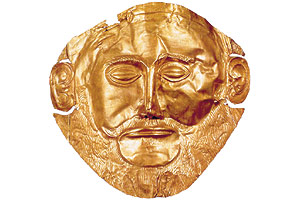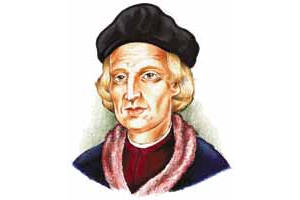Greek Civilization was not created by the native inhabitants of ancient Greece. It was born through the syncretism or cultural fusion of the different peoples that settled in the region.
While Pharaohs reached the peak of their power in Egypt, the first civilization to establish in the region, called Minoan or Cretan Civilization (3000-1200 B.C.), was developing in the islands of the Aegean Sea.
Around 1900 B.C., an Indo European people coming from the Danube Plains, the Acheans, settled in the Balkans and advanced into the Peloponnese, dominating the native inhabitants of the region, the Pelasgians.
The Acheans were competent warriors and sailors, and developed agriculture, shepherding and ceramics. Their strongest kings ruled the cities of Tiryns and Mycenae. It is thanks to this last city that we have information of Achean culture, also known as Mycenaean.
After consolidating their rule over the Peloponnese, the Acheans extended their power to the Aegean Sea. Around 1400 B.C., they invaded Crete, assimilating the island’s civilization. Later, they landed in Asia Minor (in the Peninsula of Anatolia). Mycenaean King Agamemnon supposedly led an expedition there that defeated Troy around 1260 B.C.
Alongside this, other invaders broke into Continental Greece. The Ionians settled mainly in Attica (the peninsula where Athens is located), Central Greece and the Cyclades Islands. The Aeolians established themselves further north, in Thessaly.
Around the 9th Century B.C., other Indo European conquerors, the Dorians, penetrated the Greek peninsula from the North -they came from the regions of Macedon, Thrace and Epirus- and headed for the Peloponnese. Their iron swords and shields outperformed the Achean bronze ones, so, despite their fierce resistance, they were eventually defeated.
Some Acheans were enslaved, the rest emigrated. Many took refuge in Attica and the rest established themselves in the Aegean islands and the coastal regions of Asia Minor, known as Ionia.
Although they conquered almost all the Peloponnese Peninsula, the Dorians dwelled only in Doris, Argolis and Laconia.
The Dorian invasion meant the end of the Mycenaean culture and the advent of a new stage of decline that prolonged itself until 776 B.C., when the «Archaic Period» began. The Hellenic or Greek people was constituted during this period.
The Olympic Games
Originally, Greeks lived in tribes that, given the abrupt nature of Greece’s Geography, became independent communities. Virtually the only unifying element was their religion, a complex mythology which included Gods and Demigods with a human body together with great powers and abilities.
These deities formed a great family led by Zeus (The Deity of Order and Justice). The Gods gathered in Zeus’ Palace on the top of Mount Olympus to drink a marvelous elixir, Ambrosia. Ambrosia made them immortal and kept them eternally young.
To honour their gods, the Greeks built beautiful temples and held large festivals. Sporting games played a significant role in these celebrations held in Olympia to honour Zeus, in Corinth for Poseidon (God of the Seas) and in Delphos for Apollo (God of light, poetry music and wisdom).
The oldest and most famous of Greek celebrations, the «Olympic Feasts«, began to be celebrated in 776 B.C. They were held every four years in the city of Olympia, in the northeast of the Peloponnese and were open to male participation only. They lasted five days. During the first and fifth, there were processions, sacrifices to please Zeus and a communal banquet. The competitions were held in the stadium that was 192,3m long. The most expected competition was the pentathlon, comprised of five tests (long jump, short distance running race, discus throw, javelin throw and wrestling) and the most prestigious were horse and chariot races. The winners were crowned with an olive wreath.
All warfare in Greece had to cease while the games were being held. A special peace guaranteed the security of all participants. Delegations came from all Greece and even from their remotest colonies in Asia Minor and Sicily.








 Muere Cristóbal Colón
Muere Cristóbal Colón